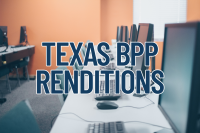Hire a Professional to File Your Texas Business Personal Property (BPP) Rendition

Here’s what you need to know about filing a Texas business personal property rendition:
- In Texas, businesses must file a BPP rendition by April 15 each year that reports the value of tangible personal property used to generate income.
- Failing to file a rendition could incur a 10% tax fine and leave your BPP valuation up to the county’s estimation, which often exceeds the actual market value.
- You may challenge the county’s BPP valuation by notifying the Appraisal Review Board (ARB) by May 15 and presenting compelling evidence during a hearing.
- A property tax professional like Gill, Denson & Company can help you navigate the complex process of identifying taxable items and reducing your BPP tax burden.
What Is a Business Personal Property (BPP) Rendition?
In Texas, businesses are required to pay property taxes on tangible personal property used to generate income, known as business personal property (BPP). This includes items such as furniture, equipment, inventory, and business vehicles. It is important to note that intangibles such as software on a computer should not be included as BPP. It can be challenging to separate the value of intangibles from tangibles, but it is important in order to get an accurate tax assessment. You must file a rendition with your self-reported BPP value to the county appraisal district (CAD) by April 15 each year. You’ll pay property taxes based on that amount (or the county’s valuation) in January of the following year.
What Happens If I Don’t File a Rendition?
Some small businesses don’t realize you have to file a rendition. When you don’t file, you could face a 10% tax fine, and the county will determine your taxable BPP value. Since they don’t have an accurate portrait of your business property, they’re guessing based on your business type and industry. This leads to many mistakes. Assessed values for business personal property can vary greatly from one business to another. This can result in an assessment higher than your BPP’s market value, which will result in paying more than your fair share of property taxes.
What If the County Disagrees with My Rendition Valuation?
When filing your rendition, you need to get an accurate accounting of BPP items and their taxable value. If the county disagrees with your rendered value, they may assign their own estimation (similar to when you don’t file). However, you may challenge their BPP valuation. Notify the local Appraisal Review Board (ARB) no later than May 15, identifying the subject property and your reason for protesting (Tax Code 41.44). You’ll need to clearly present a compelling reason(s) why your BPP should be valued differently. This takes place during either an informal hearing or a more formal ARB hearing.
Why Should I Work With a Professional?
One of the most important, and often complex, tasks is sorting the taxable, tangible items from the non-taxable, intangible items. Working with a property tax professional ensures you don’t miss any savings opportunities. The team of tax experts at Gill, Denson & Company is ready to help you through this process to reduce your BPP tax liability.
We will handle the entire process on your behalf, from filing timely renditions to ensuring correct asset valuations. We charge a flat fee of $299 per property, with additional fees for more complex accounts. If you want to protest the valuation after filing, we can assist with that, too. In that case, you’ll only pay a 35% contingency fee on the amount we save you. We’re committed to working as hard as possible to maximize your savings.
Hire a professional to file your business personal property rendition and get it right the first time, so you don’t need to protest. Get started with Gill, Denson & Company today – the 2024 rendition filing deadline is approaching soon!









